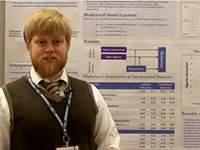Mindfulness: A Habit of Mind That Predicts Social Status in Youth
Social status asymmetries are a persistent feature of human life. Occupying a position at the top versus the bottom of a social hierarchy during youth development produces substantially disproportionate effects on well-being, learning, and longevity. Adaptive social behavioral patterns and trustworthiness are among the foremost determinants of youth social status, and mindfulness training enhances healthy social functioning. Accordingly, the present study tested the extent to which early adolescents’ disposition toward mindful states of attention and awareness predicted their peer- and teacher-rated social status, as mediated by behavioral adaptation and trustworthiness. Support for this hypothesis was found. Dispositional mindfulness may, indirectly, improve adolescent’s social standings in school.
James L. Floman
University of British Columbia, Canada





APS regularly opens certain online articles for discussion on our website. Effective February 2021, you must be a logged-in APS member to post comments. By posting a comment, you agree to our Community Guidelines and the display of your profile information, including your name and affiliation. Any opinions, findings, conclusions, or recommendations present in article comments are those of the writers and do not necessarily reflect the views of APS or the article’s author. For more information, please see our Community Guidelines.
Please login with your APS account to comment.